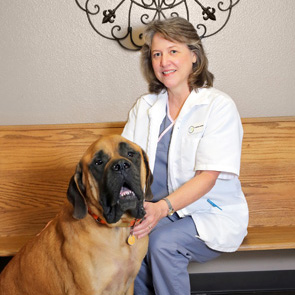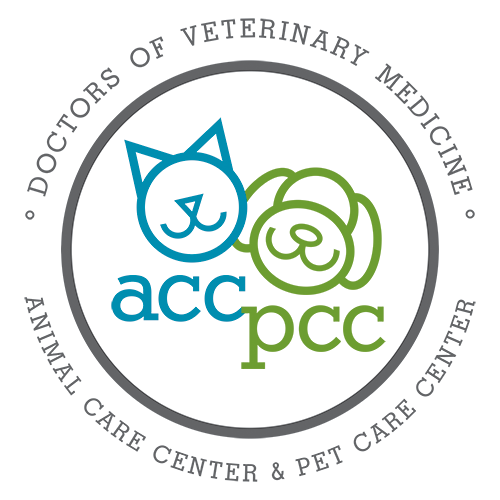February is National Pet Dental Month!


Dr. Melanie Lavergne
All of us at Animal Care Center and Pet Care Center feel that dental health is very important to your pet’s well being. We are offering 10% off of dental cleanings scheduled during this month, and we encourage you to take advantage of this offer at either clinic.
Periodontal disease is the most common problem we see in cats and dogs. By two years of age, 70% of cats and 80% of dogs have some form of periodontal disease. Basically, periodontal disease develops when bacteria have invaded the gum tissue. In very severe cases, the bacteria can get into the bloodstream and lead to damage of the kidneys, liver, and heart muscle.
Your pets cannot tell you when they are suffering from a toothache. Very often, pets do not show obvious signs of dental pain. This is a survival mechanism they have in common with their wild ancestors. However, there are some signs of periodontal disease that you can watch for. Bad breath is the most common sign. Bad breath, or halitosis, is caused by the bacteria that infect the gum tissue. You may notice that your pet repeatedly chews on one side of the mouth, drops food when eating, or they have stopped grooming themselves. Sometimes they are reluctant to allow you to touch them around their mouth or their face. You may see thick, ropey saliva or spots of blood on toys, beds, or in their food and water bowls. This can be from gingival infection or a fractured tooth. There might even be bleeding from the nose or a bloody discharge when sneezing. Small breed dogs with severe periodontal disease are especially prone to infection entering the nasal cavity.
Animal Care Center in Hammond now offers dental radiography, which can be helpful for pets for a number of reasons. Large breed dogs, often times, will chip or fracture a tooth. Dental x-rays help determine if a tooth root is infected and needs treatment. Small breed dogs can develop a weakened jawbone from infection which can eventually lead to fracture of the jaw. Cats often suffer from disease that erodes the crown of the tooth and leaves the sensitive root under the gum line. This problem can be diagnosed with dental x-rays.
All too often we hear someone say, “My pet is too old to have their teeth cleaned.” This cannot be further from the truth. The incidence of periodontal disease increase with age. We can perform simple blood tests to check your pet’s blood sugar and assess the function of their liver and kidneys before any procedures. Then your pet is treated as though they are at the spa, with clean teeth, fresh breath, nails trimmed, and warm fluids given during the procedure. While senior pets may have some circumstances that warrant special care and planning, proper dental care can improve the overall health of your pet.
After your pet’s teeth are cleaned and polished, we apply a barrier sealant to the teeth called Oravet. This sealant has been shown to decrease the buildup of plaque and tarter. While this is not a replacement for brushing, you can choose to take home an Oravet Kit to reapply to your pet’s teeth weekly to help maintain their clean teeth.
Just as with people, brushing your pet’s teeth is the best prevention for tooth and gum disease. It is best to begin preventive care when they are puppies and/or kittens. You can start with a damp wash cloth wrapped around your finger or a finger brush and later advance to a soft pet toothbrush. You will want to use toothpaste that is made for pets since they cannot spit and swallowing human toothpaste can cause an upset stomach in pets. We offer toothbrushes and a variety of toothpaste for your pets to try.
There are many other products to help remove plaque and tarter. You will want to choose products that have the seal of acceptance from the Veterinary Oral Health Council (VOHC). You can visit their website at http://www.vohc.org/AcceptedProductsTable.pdf
We carry Hill’s Prescription Diet T/D for both cats and dogs. This product is a food that promotes dental health for your pet. Additionally, we have treats that are available in which promotes dental health as well by the Greenies Brand.
Help keep you and your pet’s smiling by promoting dental health.
Click below for a demonstration on how to brush your pet’s teeth:
http://veterinaryteam.dvm360.com/client-education-video-how-brush-pets-teeth
